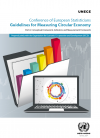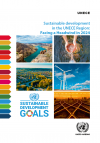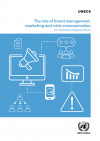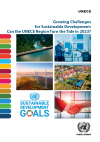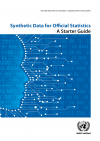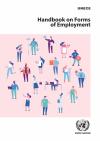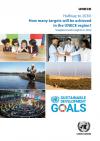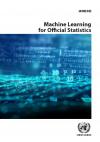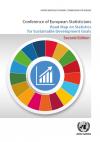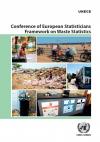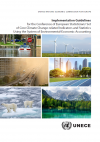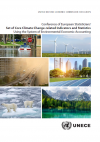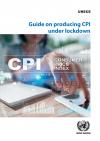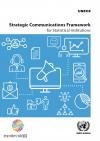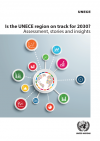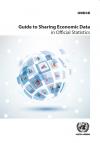Publications
Displaying Results 1 - 20 of 96
- English
In the past two decades, many countries and the European Union have been orienting their waste and materials management policies towards preventive and integrated approaches, with emphasis on the life-cycle and supply chains of materials and products. Policy initiatives aimed at establishing a circular economy (CE) have increased as an essential contribution to a sustainable, low carbon, resource
- English
ONLINE PUBLICATION
This publication provides the 2024 progress assessment on the Sustainable Development Goals (SDGs) in the region of the United Nations Economic Commission for Europe (UNECE), based on the data available in the United Nations Global SDG Indicators Database.
The results are presented at the regional level, identifying
- English
In the age of the information deluge, National Statistical Offices (NSOs) and International Statistical Organizations serve as vital sources of independent, reliable, and trusted Official Statistics. Amidst the proliferation of alternative data sources and global misinformation, these organizations need to highlight their contributions and the distinctive qualities that establish Official
- English
ONLINE PUBLICATION
This publication provides a progress assessment on the Sustainable Development Goals (SDGs) in the region of the United Nations Economic Commission for Europe (UNECE), based on the data available in the United Nations Global SDG Indicators Database.
The results are presented at the regional level, identifying the SDG targets that the
- English
Producers of official statistics face a complicated task in managing users’ access to the data they collect, as they must maintain the confidentiality of the individuals or businesses who have provided their data to them, while being under pressure to release ever more detailed datasets in order to provide greater analytical insight to those who wish to use such data.
Traditionally, national
- English
In recent years, many countries have witnessed the emergence and growth of new forms of employment, driven by economic changes, the adoption of new business models, technological advancement, and continuing digitalization. New ways of organising work and production have been accelerated by the COVID-19 pandemic, leading to a further increase in the scale and scope of new forms of employment.
- English
ONLINE PUBLICATION
This publication provides a progress assessment on the Sustainable Development Goals (SDGs) in the region of the United Nations Economic Commission for Europe (UNECE), based on the data available in the United Nations Global SDG Indicators Database.
The assessment identifies targets on which the overall progress in
- English
Machine Learning holds a great potential for statistical organisations. It can make the production of statistics more efficient by automating certain processes or assisting humans to carry out the processes. It also allows statistical organisations to use new types of data such as social media data and imagery.
Many national and international statistical organisations are exploring how machine
- English
The second edition of the Road Map on Statistics for SDGs aims to provide guidance to members of national statistical systems and other stakeholders on how to best navigate the complex task of measuring the achievement of the goals and targets of the 2030 Agenda. By doing so, it strives to strengthen reliable data-based national information systems and support efforts to achieve the Goals.
The
- English
Official waste statistics have been produced for more than 40 years. They were initially developed to monitor and manage threats to human health and the environment. More recently, information needs have shifted toward realizing the economic value of waste, particularly in the context of the “circular economy”. This change has created demand for information on waste types that have not
- English
This document provides practical guidelines on how to implement the Conference of European Statisticians’ Core Set of Climate Change-Related Indicators (CES Indicator Set), taking into account national policy priorities and data availability. It
- English
Climate change is an existential threat and provides an immense challenge for humanity. A better understanding of all its aspects, through monitoring, modelling, analysis and reporting, is crucial to decide on the best course of action.
This document presents a set of core internationally comparable climate change-related indicators and statistics, developed by a dedicated UNECE Task Force
- English
The lockdown that followed the outbreak of the Covid-19 pandemic in 2020 posed unprecedented challenges to produce the consumer price index (CPI) in many countries. The closing of retail outlets and difficulties with collecting prices from outlets that remained open caused significant drops in the number of collected prices. Statistical offices, therefore, had to explore new data sources and
- English
Strategic communication is a relatively new concept for most statistical organizations, which have traditionally focused their efforts and resources on dissemination practices and systems. A strategic communication function can guide the development and implementation of a communication strategy. This has particular relevance for the world of official statistics, where communication and
- English
This report provides a progress assessment on the Sustainable Development Goals (SDGs) in the region of the United Nations Economic Commission for Europe (UNECE), based on the data available in the United Nations Global SDG Indicators Database and on the statistical methodology commonly used by all five United Nations regional commissions.
The assessment identifies targets on which the overall
- English
Measuring the activities of multinational enterprise groups is one of the major challenges facing producers of official statistics today. Sharing data nationally and internationally on the activities of multinational enterprise groups has become necessary to ensure the high quality of official statistics.
This Guide follows in the steps of the two previous guides on globalization - The Impact of
- English
The Guidelines provide practical guidance on how to develop and maintain statistical business registers to support the production of business demography and entrepreneurship statistics. The Guidelines contain definitions and compilation guidance for key demographic events and propose business demography indicators that can be produced directly from the register. They also describe the
- Pусский
Статистический регистр предприятий играет центральную роль в производстве экономической статистики, как с точки зрения способа производства статистики, так и с точки зрения ее содержания и качества. Для оказания помощи странам Руководство по статистическому регистру предприятий содержит практические руководства и рекомендации по созданию и поддержанию статистического регистра предприятий.
- English
The 2nd edition of the Road Map, published in February 2022, can be found here.
The publication provides guidance to national statistical offices on producing statistics for SDGs. It lays out what needs to be done, who are the stakeholders, and what are the opportunities for cooperation. The Road Map deals with
- Pусский
Глобализация открывает новые возможности и обостряет конкуренцию, вынуждая производителей искать более эффективные способы производства своей продукции. Тем не менее, в последние годы учет глобализированных схем организации производства в национальной статистике стал очень сложной проблемой, это привело к пересмотру источников данных и методов измерения глобального производства с целью


